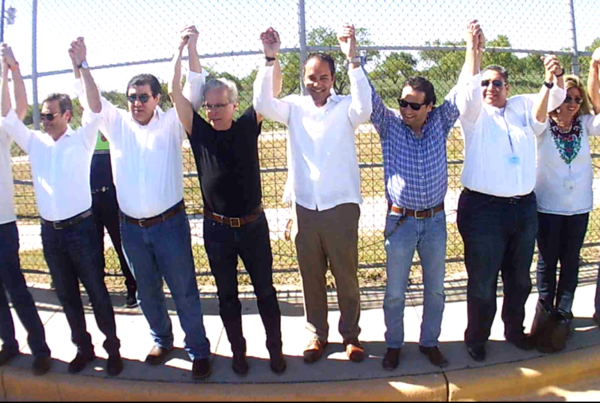The Standard’s news roundup gives you a quick hit of interesting, sometimes irreverent, and breaking news stories from all over the state.
Last month Governor Greg Abbott cut almost $2 million worth of grants to Travis County over the sheriff’s new immigration policy. That policy limited voluntary cooperation with federal immigration authorities. But the cuts didn’t affect any county programs that have anything to do with immigration.
Brandi Grissom is the Austin Bureau Chief for the Dallas Morning News.
“In fact the cuts primarily targeted programs that prevent people who are veterans or drug addicts from spending time in jail,” Grissom says.
She said one initiative that took a hit was the Parenting in Recovery program – a family drug court that helps keep kids out of the foster care system.
That program lost $145,000.
“For this program, it meant a lot because it took away their ability to drug screen parents in the program who are trying to get clean and making sure that they’re staying sober while they’re taking care of their kids,” she says.
Grissom said the first family drug court in Texas was established in San Antonio in 2004 – and these days there’s eight such courts in the state. The Travis County program has kept more than 300 kids out of the foster care system since 2008.
In the last 2 years, family drug courts statewide have received almost $1.4 million from the governor’s office.
“Where this comes into play with the sanctuary cities debate currently going on at the legislature is that all of those programs, all of the funding that comes from the governor’s office to those programs, could be in jeopardy if the sanctuary legislation passes and officials in those counties where the program exists decide not to fully comply with federal immigration laws or in some other way get crosswise with this new sanctuary city law,” she says. “And what that would mean is potentially hundreds of children who are currently kept off the foster care rolls potentially going back on to it.”
The Texas Senate has already approved a bill that would withhold state funding from counties that adopt so-called sanctuary city policies.
You can also listen here to a previous story about how President Trump’s immigration policies could affect the number of children entering the Texas foster care system.
Move over Rick Perry – another Texan is about to join the Trump Administration. Irving Mayor Beth Van Duyne announced yesterday that she would be working for the White House but said the exact role would be revealed publicly next week.
Van Duyne has served two terms as mayor and drawn attention for what critics have called anti-Muslim statements.
Texas Tech University has a pigeon problem. Richard Stevens with the Lubbock university’s Department of Natural Resources Management says it wasn’t always like this.
“In 2002 there was no pigeon problem at all,” he says. “We had a few pigeons on campus – nothing like today. And then I started working here in 2014 and there’s just this massive pigeon population with pigeon droppings everywhere.”
He says Texas Tech spends anywhere between $150,000 to $400,000 a year just power-washing campus structures, like the football stadium. So, it was time to get creative.
“Well, there’s a product on the market called OvoControl and it is specially designed for pigeons,” he says.
You might have guessed – but yes – this is birth control for pigeons. The idea is to use this method to humanely reduce the pigeon population over time. But even though this product is for pigeons – it hasn’t been tested on a large scale. That’s where Erin Bohoender, a Ph.D. student in the same department as Stevens, comes in.
“And what I’m doing currently is analyzing the abundance on campus, we’re trying to get a good estimate of the abundance so when we start doing the OvoControl we can see how it’s working over time,” Bohoender says.
She will be helping track how effective birth control is at reducing the invasive bird population. The hope is to see a difference in two to three years.

















